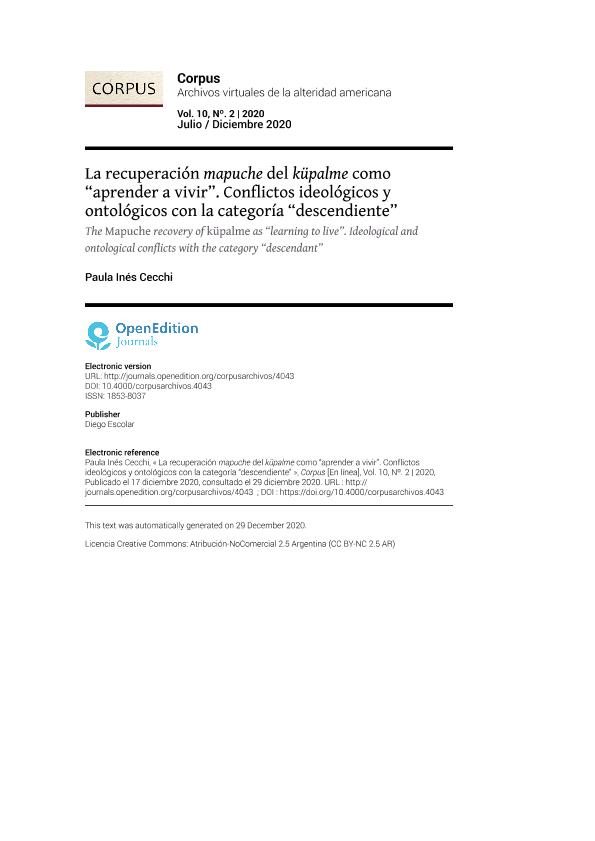Mostrar el registro sencillo del ítem
dc.contributor.author
Cecchi, Paula Inés

dc.date.available
2021-09-23T20:06:33Z
dc.date.issued
2020-12
dc.identifier.citation
Cecchi, Paula Inés; La recuperación mapuche del küpalme como ''aprender a vivir'': Conflictos ideológicos y ontológicos con la categoría ''descendiente''; Diego Escolar; Corpus; 10; 2; 12-2020; 1-25
dc.identifier.uri
http://hdl.handle.net/11336/141415
dc.description.abstract
En este artículo analizo los sentidos hegemónicos de la categoría “descendiente” (de mapuche), sus usos autoadscriptivos y el concepto mapuche küpalme, referido a la procedencia. Argumento que las reflexiones entre integrantes del pueblo mapuche sobre el término “descendiente” involucran dos planos: uno ideológico y otro ontológico. En el plano ideológico, discuten con el discurso hegemónico ―que en el marco de la ideología del mestizaje anuncia la pérdida de identidad mapuche― al que caracterizan como racista y definen “descendiente” como una categoría colonial mediante la que se ejerce violencia epistémica. En el plano ontológico discuten con la ontología moderna que solo asume la agencia humana y considera la herencia como un fenómeno biológico, dado y relativo al pasado. En el concepto de küpalme reconocen la agencia de otras fuerzas y entidades además de las humanas, no solo en el pasado sino como guía para la toma de decisiones en el presente. En los usos autoadscriptivos del término “descendiente” se expresan sentidos contrapuestos que remiten a esas disputas. Aun afectadas por los criterios de las definiciones hegemónicas sobre quién puede ser mapuche, las personas que se autoidentifican como descendientes y buscan reencontrarse con la historia de su pueblo se distancian del postulado que define la pérdida inexorable de la identidad, en un proceso de des-sujeción respecto al discurso hegemónico.
dc.description.abstract
In this paper I analyze the hegemonic meanings of the term (Mapuche) “descendant”, its self-ascribed uses, and the Mapuche concept of küpalme, which refers to their origin. My argument is that the discussion among the Mapuche people over the category “descendant” involves two different levels: an ideological level and an ontological one. On the ideological level they discuss with the hegemonic discourse―which, in line with the ideology of mestizaje, announces the loss of Mapuche identity― by characterizing it as racist and by defining “descendant” as a colonial category through which epistemic violence is exerted. On the ontological level they discuss with the modern ontology, which assumes the agency only of humans and which considers heritage as a biological and given phenomena that refers to the past. In the concept of küpalme they recognize the agency of other forces and entities besides humans, and not just in the past but also guiding the making of decisions in the present. The self-ascribed uses of the term “descendant” express opposed meanings referring to these disputes. Even when affected by the hegemonic criteria about who can be Mapuche, the persons who recognize themselves as descendants and who seek to rediscover the Mapuche people’s history and be part of it grow apart from the statement that sustains the inexorable loss of identity, in a process of desubjection from the hegemonic discourse.
dc.format
application/pdf
dc.language.iso
spa
dc.publisher
Diego Escolar
dc.rights
info:eu-repo/semantics/openAccess
dc.rights.uri
https://creativecommons.org/licenses/by-nc/2.5/ar/
dc.subject
MAPUCHE
dc.subject
DESCENDIENTE
dc.subject
IDEOLOGÍA DEL MESTIZAJE
dc.subject
CONFLICTOS ONTOLÓGICOS
dc.subject.classification
Antropología, Etnología

dc.subject.classification
Sociología

dc.subject.classification
CIENCIAS SOCIALES

dc.title
La recuperación mapuche del küpalme como ''aprender a vivir'': Conflictos ideológicos y ontológicos con la categoría ''descendiente''
dc.title
The Mapuche recovery of küpalme as ''learning to live'': Ideological and ontological conflicts with the category ''descendant''
dc.type
info:eu-repo/semantics/article
dc.type
info:ar-repo/semantics/artículo
dc.type
info:eu-repo/semantics/publishedVersion
dc.date.updated
2021-09-06T20:16:42Z
dc.identifier.eissn
1853-8037
dc.journal.volume
10
dc.journal.number
2
dc.journal.pagination
1-25
dc.journal.pais
Argentina

dc.journal.ciudad
Mendoza
dc.description.fil
Fil: Cecchi, Paula Inés. Universidad Nacional de Río Negro. Sede Atlántica. Centro Interdisciplinario de Estudios sobre Derechos, Inclusión y Sociedad; Argentina. Consejo Nacional de Investigaciones Científicas y Técnicas. Centro Científico Tecnológico Conicet - Patagonia Confluencia; Argentina
dc.journal.title
Corpus
dc.relation.alternativeid
info:eu-repo/semantics/altIdentifier/url/http://journals.openedition.org/corpusarchivos/4043
dc.relation.alternativeid
info:eu-repo/semantics/altIdentifier/doi/https://doi.org/10.4000/corpusarchivos.4043
Archivos asociados
